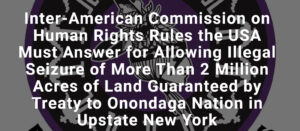
The Inter-American Commission on Human Rights has upheld the Onondaga Nation’s right to pursue claims against the United States and New York State for the unjust taking of Indigenous lands two centuries ago without approval by the US Congress or governing authorities of the Onondaga Nation.
 The landmark Admissibility ruling, issued by the IACHR which is part of the Organization of American States treaty signed by the United States and other Western Hemisphere nations, is a major step in the Onondaga’s centuries-long struggle to force New York State to account for its illegal takings and subsequent sales for profit of treaty-guaranteed land that reduced the size of the Onondaga Nation from 2.5 million acres to its current 7,500 acres.
The landmark Admissibility ruling, issued by the IACHR which is part of the Organization of American States treaty signed by the United States and other Western Hemisphere nations, is a major step in the Onondaga’s centuries-long struggle to force New York State to account for its illegal takings and subsequent sales for profit of treaty-guaranteed land that reduced the size of the Onondaga Nation from 2.5 million acres to its current 7,500 acres.
In its filings with the IACHR in response to the Onondaga complaint, the US relied on US court rulings rejecting comparable land claims by the Oneida and Cayuga Nations, sister nations to the Onondaga in the Six-Nation Haudenosaunee Confederacy. Those rulings found that Indigenous claims to ancestral lands set aside in treaties, as well as protections enshrined in the federal Trade and Intercourse Act governing the sale of Indigenous lands to non-Indigenous parties, were too old and disruptive to the non-Indigenous residents on those lands today.
In its report sent to Secretary of State Anthony Blinken and the US Permanent Representative to the OAS, the IACHR rejected that argument, noting that the OAS American Declaration on the Rights and Duties of Man gave the Onondaga standing to challenge the US’s refusal to rein in the illegal land purchases in New York State, which were carried out without the approval or authorization of the governing authorities of the Haudenosaunee Confederacy or the Onondaga Nation itself.
